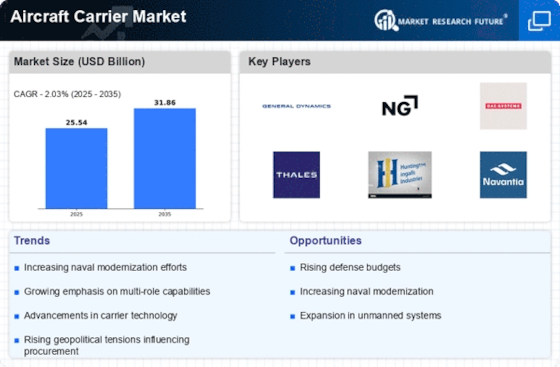Top Industry Leaders in the Aircraft Carrier Market

The Aircraft Carrier market, a crucial segment of the defense industry, is witnessing dynamic changes in its competitive landscape. As nations prioritize naval power projection, the demand for modern and technologically advanced aircraft carriers has surged. This article delves into the competitive scenario of the Aircraft Carrier market, analyzing key players, their strategies, market share dynamics, emerging companies, industry news, and prevailing investment trends.
Key Players in the Aircraft Carrier Market
Fincantieri S.P.A in italy
Thales group in France
BAE system in the UK
Navantia in Spain
Huntington Ingalls industries ltd. In us
Wincanton plc in the UK
Leonardo S.P.A in Italy
Northrop Grumman Corporation in the U.S.
General atomics in the US
Babcock international group plc in the U.K.
United shipbuilding corporation in Russia
Recent market development
Strategies Adopted by Leading Players
In an industry characterized by technological advancements and geopolitical complexities, key players in the Aircraft Carrier market are strategically positioning themselves to stay ahead. Collaborations and partnerships are becoming increasingly common, with companies forming alliances to leverage complementary capabilities. Huntington Ingalls Industries, for instance, has engaged in partnerships with key suppliers and technology firms to ensure access to cutting-edge technologies while maintaining cost-effectiveness.
Furthermore, a focus on innovation and R&D is evident among leading players. BAE Systems and Thales Group consistently invest in research and development to enhance the electronic warfare, communication, and navigation systems integrated into aircraft carriers. This focus not only ensures technological superiority but also helps in meeting the evolving requirements of modern naval warfare.
Factors for Market Share Analysis
Market share analysis in the Aircraft Carrier segment involves evaluating various factors that contribute to the success of a company. The ability to secure government contracts and partnerships, technological capabilities, financial stability, and the efficiency of project execution are crucial parameters. Huntington Ingalls Industries, being the primary contractor for the U.S. Navy's aircraft carriers, maintains a significant market share due to its consistent project delivery and financial strength. BAE Systems and Thales Group, with their global presence and diversified defense portfolios, also secure substantial market shares.
New and Emerging Companies
The Aircraft Carrier market is witnessing the emergence of new players seeking to establish themselves in this competitive domain. Companies like Navantia and Babcock International Group are gaining attention with their focus on innovative solutions and cost-effective approaches. Navantia, a Spanish shipbuilder, has been actively pursuing international contracts and partnerships, positioning itself as a formidable competitor in the global aircraft carrier market. Babcock International Group, with its expertise in engineering support services, is expanding its presence by offering comprehensive solutions for carrier maintenance and modernization.
Industry News and Developments
Recent industry news indicates a growing emphasis on technological advancements and international collaborations. The adoption of unmanned systems and artificial intelligence in naval operations is a notable trend. Leading players are investing in autonomous technologies to enhance the capabilities of aircraft carriers, making them more adaptable to evolving threats. Additionally, international collaborations, such as the joint development projects between European countries, aim to pool resources and expertise to create more cost-effective and technologically advanced carriers.
Current Company Investment Trends
Investment trends in the Aircraft Carrier market reflect the industry's dynamic nature and the constant need for modernization. Key players are allocating substantial resources to research and development, aiming to integrate state-of-the-art technologies into their carrier systems. Cybersecurity investments are also on the rise, considering the increasing reliance on interconnected systems within modern aircraft carriers. The integration of artificial intelligence, advanced sensor systems, and communication technologies remains a focal point for investment, ensuring that carriers are equipped to meet the challenges of future naval warfare.
Overall Competitive Scenario
The overall competitive scenario in the Aircraft Carrier market is shaped by a delicate balance between technological innovation, geopolitical dynamics, and financial considerations. Established players continue to dominate, leveraging their experience, financial strength, and strategic partnerships to secure lucrative contracts. However, the emergence of new companies and the collaborative efforts within the industry indicate a shifting landscape. As countries around the world modernize their naval fleets, the demand for aircraft carriers is expected to grow, presenting both challenges and opportunities for existing and new entrants in this competitive arena. The ability to navigate these complexities and stay at the forefront of technological advancements will be crucial for success in the dynamic Aircraft Carrier market.
Recent News :
Huntington Ingalls Industries, with its vast experience in shipbuilding, holds a prominent position, consistently securing contracts for building and modernizing aircraft carriers for the United States Navy. BAE Systems and Thales Group, renowned for their expertise in defense electronics and systems integration, play crucial roles in providing advanced technologies for carrier operations globally.











